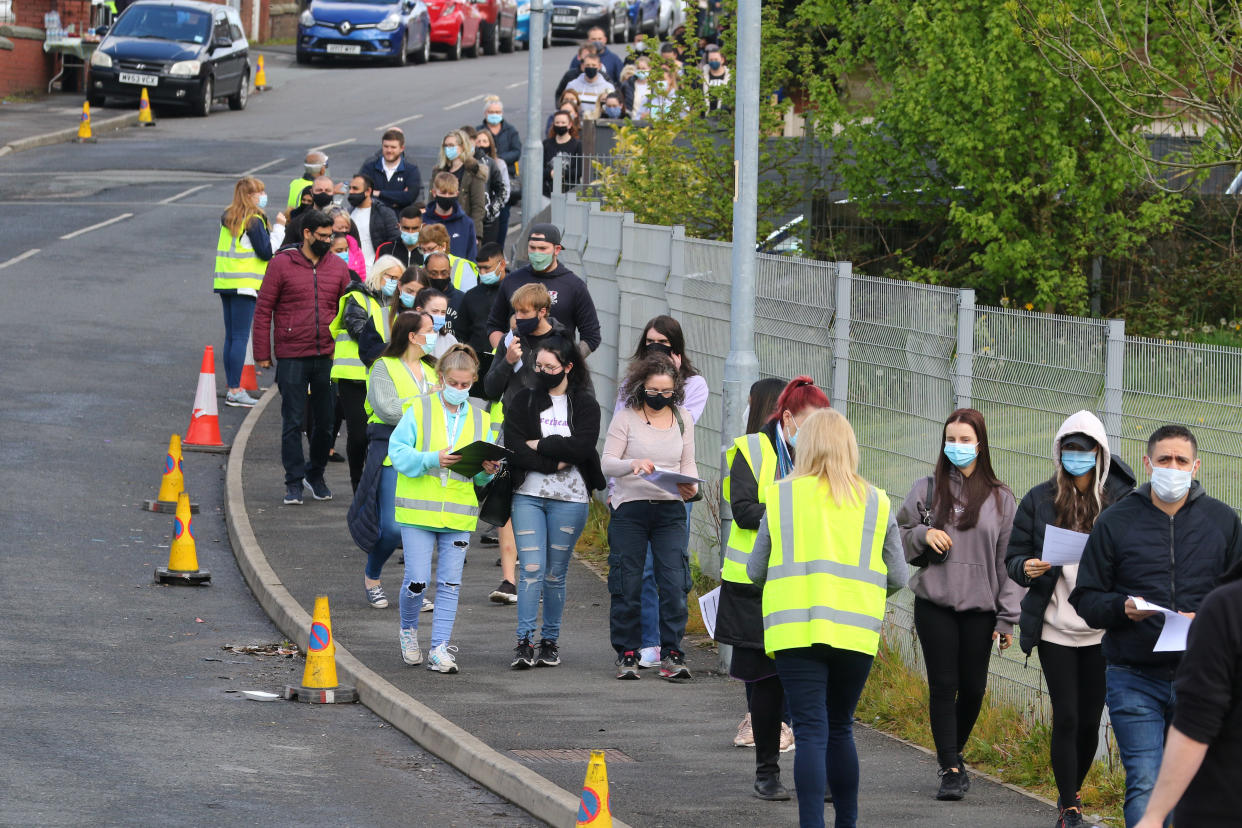Local areas should stick to vaccine priority list despite Indian variant, insists government

The government has insisted local areas should stick to vaccine priority guidelines rather than offering a jab to "anyone who wants it", despite the spread of the Indian COVID variant.
The prime minister’s official spokesman said on Monday the government’s Joint Committee on Vaccination and Immunisation (JCVI) maintained the best way to protect against the new variant was to ensure vulnerable groups got their second dose of the vaccine.
He said: “This is a decision made by the JCVI about how best to deploy the vaccines we have, but we have deployed thousands more additional doses in Bolton so they can do this work of getting vaccinations to people.”
Asked whether the government would stop local officials giving vaccines to younger people, he said: “We want every part of the country to abide by the advice set out by the JCVI, it’s this unified approach that has allowed us to proceed so quickly with our vaccine rollout.”
It comes after long queues over the weekend at vaccination centres in Bolton, where the Indian strain is spreading, and reports that people as young as 17 have been called upon to have a jab there.
COVID-19 vaccines are currently only available in England to people aged 38 and over, although the over-35s will be invited in the coming days to take their first jab.
Earlier, business secretary Kwasi Kwarteng said he did not approve of moves to break from age range rules about who should receive a COVID-19 vaccine.
He told Sky News: “The government has very clear guidelines in terms of the ordered way in which we roll out the vaccine.
“That has been working and has been a very effective rollout, and we would suggest that people should do it in the correct order, in the right way.
“I don’t know the actual details of what is going on in Bolton but we’ve got very firm guidelines and we want people to follow those.
“There is a really good way that we’ve managed to roll out the vaccine and we would urge people to follow the guidelines that we’ve set out and the method that we’ve used.”
Watch: Bolton residents queue for vaccines as Indian variant spreads
But London mayor Sadiq Khan said on Monday that COVID-19 vaccines should be given to younger people in parts of the country where the Indian variant is causing concern.
He called on the government for the “flexibility to give younger people the vaccine in those parts of London concerned about this strain”.
He told Sky News: “What we are saying is be nimble in those pockets where we know there is an issue, let’s use the vaccine sensibly”.
Khan said there should be a “hyper-local approach” in affected boroughs which should include “those who are younger, who would have to wait a few weeks, to have this vaccine now to avoid the strain spreading”.
Pubs and restaurants can serve customers inside as England returned to indoor socialising on Monday, as six people or two households can meet inside and overnight stays are allowed.

The ban on foreign holidays has also lifted, cinemas, hotels and B&Bs can reopen and hugs between friends and family are permitted.
However, the spread of the Indian COVID-19 variant has led prime minister Boris Johnson to call for a “heavy dose of caution”, while the British Medical Association (BMA) said it was a “real worry” that indoor socialising was returning.
The Indian strain is feared to be as much as 50% more transmissible than the Kent variant.
On Sunday, health secretary Matt Hancock did not rule out the possibility of imposing local lockdowns in areas such as Bolton to tackle the Indian variant, which he warned could “spread like wildfire”.

He said there are more than 1,300 cases of the Indian variant of concern, which is “relatively widespread in small numbers” and is becoming “the dominant strain” in Bolton and Blackburn.
Hancock said “new very early data” from Oxford University showed that existing vaccines work against the Indian variant.
Dr Helen Wall, who is leading the vaccination effort in Bolton, said more than 6,200 vaccines were administered in the area over the weekend.
“We’re seeing people coming forward that clearly had the option to have the jab for some time – older people, disabled people – and they’ve chosen to come forward now,” she told BBC Breakfast.

She said before the weekend there were around 10,000 people in the area in the highest priority groups – those deemed to be clinically vulnerable and the over-50s – who were yet to be vaccinated, but added: “I’m hoping that we’ve made a big dent into that now”.
Kwarteng said on Monday there was “nothing in the evidence” to suggest the Indian variant could evade the COVID-19 vaccines rolled out in the UK.
He said: “Matt Hancock said yesterday very clearly that he had a lot of confidence that the vaccination does work against the Indian variant.
“But of course we can’t definitely prove anything until we’ve eased up and we see what the actual data shows, and that’s why we’ve got a degree of flexibility.
“But there is nothing in the evidence now that we’ve seen that suggests that the vaccine isn’t very effective against the Indian variant.”
Hancock said there had been no known deaths from the Indian variant in Bolton of somebody who has received both jabs.
Five people have been in hospital with it after receiving their first vaccine dose, while one person who had received both doses had been admitted “but that person was frail”, Hancock told BBC’s The Andrew Marr Show.
Watch: 'Increasing confidence' vaccine works against Indian variant, says Hancock


